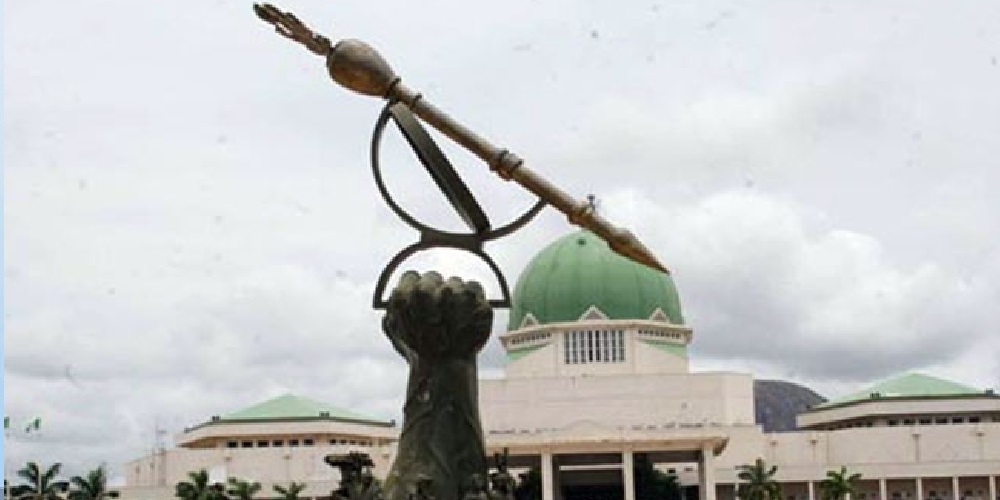News
SAD! Man kills son during fight with wife in Ogun

A heated argument between a couple in the Elega area of Abeokuta on Saturday night turned tragic when the husband, identified as Olamide, mistakenly struck his one-year-old son with an iron rod intended for his wife, leading to the child’s death.
PUNCH Metro learnt in a video from the scene of the incident obtained on Monday that Olamide had fled the area after the incident.
Residents of the community had narrated in the video that they were alerted to the incident after they heard noise from the couple’s apartment.
A co-tenant who identified as Mrs Bolatito, narrated that she was alerted by the wife that her husband had killed her son and when she got to the scene, she learnt that the couple had engaged in a fight.
Bolatito narrated that the husband had reportedly picked an iron rod attached to the weight he often lifted and attempted to smash it on his wife but the rod hit the son on the head.
She said, “At about midnight (on Saturday), I heard the lady calling out to me that I should come to her aid and that Ola (husband) had killed Ayinde (son). I was surprised, and I asked what happened. She said they had gone to Tyre and I should help them get a vehicle.
“I went outside and I couldn’t see anybody, so while I was returning home, I saw some people with a vehicle, so I said that we should take the child to Trinity because it is the nearby hospital in the area. When we got to Trinity, we were informed that the child was dead.
“Upon returning home, we realised that the child was making sounds, so we decided to take him to the hospital again, where we were told that he had died the second time.
“What I learnt was that the husband took an iron rod from a weight he often carried and attempted to smash it on the wife, but instead hit the baby on the head. He has always beaten his wife, as the previous pregnancy the wife had was lost due to the beaten from the husband.”
The chairman of the community, Ramoni Adegbola, narrated that he was alerted by neighbours about a fighting incident between the duo and upon getting there, he saw them with the child who was feeling restless.
He added that when the child was taken to the hospital, he was returned home dead, adding that the husband had been in the habit of taking illicit drugs.
“I heard the noise of help, help, they have started fighting, and I ran to the scene. On getting there, I saw them with the child, and I was informed that the child had been hit with an iron rod on the head. I called out to other residents to assist in taking the child to the hospital, and when they returned from the hospital, I was informed that the child was dead.
The couple engaged in a fight frequently, and I feel it’s because the husband often takes illicit drugs. There was a day he took something that he fainted, and I had to call on neighbours to assist in taking care of him.
“He has absconded since yesterday, but I was informed not too long ago that he reported to a police station,” Adegbola said.
When contacted on Monday for a reaction, the spokesperson for the Ogun State Police Command, Omolola Odutola, confirmed the incident to our correspondent.
The Chief Superintendent of Police disclosed that an investigation was ongoing into the incident.
“It happened, and the police are investigating,” Odutola said in a terse response.
News
Nigeria Targets Electricity Access for 300 Million Africans by 2030 – Speaker Abbas

By Gloria Ikibah
Speaker of the House of Representatives, Rep. Tajudeen Abbas has said that Nigeria is taking a frontline role in the push to expand electricity access across Africa, to help power about 300 million people on the continent by 2030.
The Speaker disclosed this while delivering the keynote address at the First Legislative Conference and Expo on Renewable Energy, organised by the House Committee on Renewable Energy, in collaboration with the United Nations Development Programme (UNDP) held in Lagos on Monday.
The conference brought together lawmakers, industry stakeholders, and development partners to explore renewable energy solutions and legislative frameworks for boosting access and affordability.
Abbas praised President Bola Tinubu’s approval of a $1 billion funding package for Nigeria’s Rural Electrification Agency in December 2024, and described it as a major boost for energy inclusion.
According to him, Nigeria’s participation in the Mission 300 initiative, a joint effort with the World Bank and African Development Bank demonstrates the country’s growing commitment to clean, sustainable energy for underserved communities.
He said: “This initiative speaks to Nigeria’s readiness to lead by example on the continent. It is about more than power, it is about development, opportunity, and progress.
News
Court delivers another judgement in favor of Amaewhule, others on Rivers Assembly crisis

By Kayode Sanni-Arewa
A Federal High Court in Port Harcourt has dismissed a case brought by lawmakers loyal to Rivers State Governor Siminalayi Fubara, challenging the positions of 27 State House of Assembly members that defected from the Peoples Democratic Party (PDP) to the All Progressives Congress (APC).
The ruling was delivered by Justice Emmanuel Obile, who explained that the lawmakers, led by Speaker Martins Amaewhule, remain valid members of the House.
This follows an earlier Supreme Court decision in February that had also refused Governor Fubara’s push to remove the defected lawmakers.
Governor Fubara’s legal team, headed by Yusuf Ali, had already withdrawn the appeal at the Supreme Court, stating that new developments had overtaken the matter.
The Rivers Assembly, represented by Wole Olanipekun, did not oppose this withdrawal.
The case at the Federal High Court was filed by three pro-Fubara lawmakers — Victor Oko-Jumbo, Adolphus Orubienimigha, and Sokari Goodboy Sokari — who asked the court to declare the seats of the 27 lawmakers vacant since they left the PDP, the party under which they were elected.
But the court ruled that their defection did not break any constitutional rule that would force them out of office.
“This court cannot close its eyes to the binding precedent of the Supreme Court, which in February recognised the leadership of the Rivers State House of Assembly under Speaker Martins Amaewhule. That decision, being from the apex court, is final and conclusive,” Justice Obile ruled.
Speaker Martins Amaewhule reacted positively to the judgment, saying it confirmed their right to stay in the Assembly.
Meanwhile, Governor Fubara’s supporters were disappointed by the decision.
This ruling marks another chapter in the political struggle between Governor Fubara and the pro-Wike faction of the Assembly, a conflict that has been ongoing since the December 2023 defections.
For now, the pro-Wike lawmakers have secured some breathing room, even as tensions continue between both camps.
News
Reps Minority Caucus condemns unlawful detention of VDM, demands his immediate release

…says we can’t standby watch state agencies abuse their powers
The Minority Caucus of the House of Representatives has condemned in the strongest terms the arrest and continued detention of social campaigner and activist, Martins Otse, popularly known as Very Dark Man (VDM), by the Economic and Financial Crimes Commission (EFCC).
In a statement jointly signed by the HoR caucus leaders, Rep Kingsley Chinda, Leader, Rt. Hon. Dr. Ali. Isa J.C Minority Whip, Rt. Hon. Aliyu Madaki., Deputy Minority Leader,,Rt. Hon. George Ozodinobi
Deputy Minority Whip, the opposition leaders declared that:
“The disturbing trend of security and law enforcement agencies deploying their powers arbitrarily against citizens exercising their rights to free expression poses grave threats to our democracy.
“We must state clearly that such acts, cloaked in the guise of enforcement, erode public confidence in the rule of law and undermine the principles of accountability and transparency.
The caucus insisted that: “The arrest of Mr. Otse which reportedly took place without the issuance of a warrant is a direct violation of the 1999 Constitution of the Federal Republic of Nigeria (as amended) that guarantees the liberty of the citizen except in accordance with the due process of law. Sections 35(1) and 35(3) of the Constitution stipulate the conditions under which a person may be deprived of their liberty and require that any person arrested must be informed promptly of the reasons for their arrest and any charges against them.
“The EFCC, like every other agency of government, is bound by these constitutional provisions and must not act outside their bounds.
“Moreover, the continued detention of Mr. Otse beyond the constitutionally permissible period of 24 to 48 hours without being charged to court is not only an abuse of power, it is also a blatant affront to the principles of natural justice and fair hearing.
“The Constitution, under Section 35(4), provides that a person who is arrested or detained must be brought before a court of law within a reasonable time, which, in the case of an arrest without a warrant, shall not exceed two days.
“Any deviation from this is a breach of the citizen’s fundamental rights and a descent into lawlessness.
“As the voice of the opposition in the National Assembly, the Minority Caucus calls on the EFCC to immediately release Mr. Otse or charge him to court in accordance with the law.
“Arbitrary arrests and prolonged detentions of citizens for expressing dissenting or unpopular views must have no place in a democratic society.
“The preservation of liberty, due process, and respect for constitutional rights remain the bedrock of our republic. We will not stand idly by while state agencies abuse their powers to suppress voices that challenge the status quo in line with the laws.
-

 News6 hours ago
News6 hours agoWhy ‘VeryDarkMan was arrested – EFCC
-

 Economy17 hours ago
Economy17 hours ago75.5% of rural Nigerians now live below poverty line — World Bank
-

 News17 hours ago
News17 hours agoMassive turnout as Bishop David Abioye holds first service in new church + Video
-

 Education9 hours ago
Education9 hours agoOver 1.5m candidates score less than 200 in 2025 – UTME
-

 News17 hours ago
News17 hours agoHow US-Based Yoruba Monarch Died After Brutal Assault In Oyo Palace, Allegedly Ordered By Alaafin Amid Supremacy Row With Ooni Of Ife
-

 Entertainment6 hours ago
Entertainment6 hours agoHow I narrowly escaped death in U.S hotel room – Seun Kuti
-

 News8 hours ago
News8 hours ago‘S3x is good, I enjoy it,’ Bishop Adejumo tells wives
-

 News16 hours ago
News16 hours ago‘Cabals’ still fighting against our refinery — Dangote






